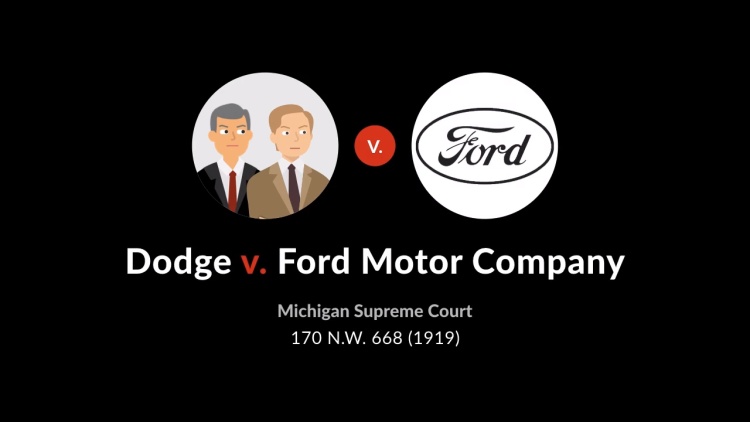Dodge v. Ford Motor Co.
Michigan Supreme Court
170 N.W. 668 (1919)
- Written by Max Milstein, JD
Facts
The Ford Motor Company (Ford) (defendant) was incorporated in 1903 and began selling motor vehicles. Over the course of its first decade, despite the fact that Ford continually lowered the price of its cars, Ford became increasingly profitable. On top of annual dividends of $120,000, Ford paid $10 million or more in special dividends annually in 1913, 1914, and 1915. Then, in 1916, Ford’s president and majority shareholder, Henry Ford, announced that there would be no more special dividends and that all future profits would be invested in lowering the price of the product and growing the company. The board quickly ratified his decision. Henry Ford had often made statements about how he wanted to make sure people were employed and to generally run the company for the benefits of the overall community. The Dodge brothers (plaintiffs), who owned their own motor company, were minority shareholders in Ford and sued to reinstate the special dividends and stop the building of Ford’s proposed smelting plant. The lower court ordered the payment of a special dividend and enjoined Ford from building the smelting plant. Ford appealed.
Rule of Law
Issue
Holding and Reasoning (Ostrander, J.)
What to do next…
Here's why 905,000 law students have relied on our case briefs:
- Written by law professors and practitioners, not other law students. 47,100 briefs, keyed to 995 casebooks. Top-notch customer support.
- The right amount of information, includes the facts, issues, rule of law, holding and reasoning, and any concurrences and dissents.
- Access in your classes, works on your mobile and tablet. Massive library of related video lessons and high quality multiple-choice questions.
- Easy to use, uniform format for every case brief. Written in plain English, not in legalese. Our briefs summarize and simplify; they don’t just repeat the court’s language.





